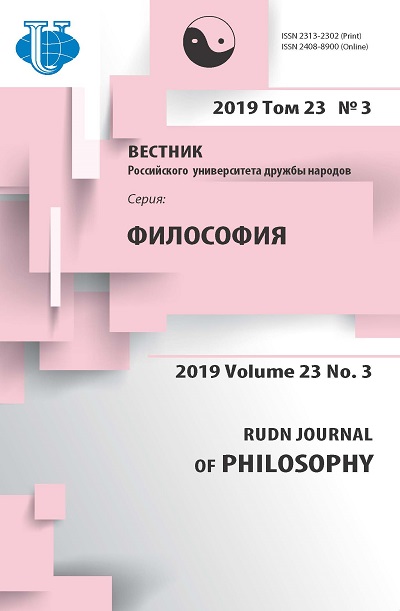SHIFTS IN THANATOLOGICAL APPROACH UNDER THE INFLUENCE OF BIOMEDICAL PROGRESS: ONTOLOGICAL, ANTHROPOLOGICAL, ETHICAL
- Authors: Zhelnin AI1
-
Affiliations:
- Perm State University
- Issue: Vol 23, No 3 (2019)
- Pages: 324-333
- Section: MORAL DILEMMAS IN THE ERA OF HIGH-TECH SOCIETY
- URL: https://journals.rudn.ru/philosophy/article/view/21939
- DOI: https://doi.org/10.22363/2313-2302-2019-23-3-324-333
Cite item
Full Text
Abstract
Death is an invariant of human existence, a kind of its “omega point”. At the same time, the attitude towards it is not a constant, but rather undergoes changes, being incorporated in a wide sociocultural context. The mail goal of the article is an analysis of the nature of these changes at the present stage specifically under the influence of rapid biotechnological progress and dilemmas generated by these changes. Firstly, there is a tendency of increasing optimism: some theorists tend to perceive death not as an inevitable reality, but rather as a problem and a challenge. At the same time a radical direction arises, believing that death can be overcome only through the complete separation of man from its body substrate. The utopian nature of this project forces more moderate theorists to look for indirect way, which consists in a “war” with aging as the main predecessor of death, up to attempts of its complete abolition. Gradually, the formation of scientific immortology as a kind of opposition for thanatology takes place. At the same time, many theorists, and even more ordinary people remain skeptical position about the prospects for victory over death. It can be concluded that biomedical progress actualizes general human intention for self-preservation and death avoidance, but science requires an assessment of not only the objective possibilities for overcoming death but also both ontological and anthropological (including moral) consequences of it.
Keywords
About the authors
A I Zhelnin
Perm State University
Author for correspondence.
Email: zhelnin90@yandex.ru
кандидат философских наук, доцент кафедры философии
15, Bukireva St., Perm, 614990References
- Ar'es F. Human in front of face of death. Moscow: Progress; 1992. (In Russ.).
- K'erkegor S. Strakh i trepet. Moscow: Kul'turnaya revolyutsiya; 2010. (In Russ.).
- Lamont K. Illusion of immortality. Moscow: Politizdat; 1984. (In Russ.).
- Perfilova TB, Polikarpova NA. Problem of death and its interpretation in branches of humanitarian knowledge. Yaroslavskii pedagogicheskii vestnik. 2009; 3 (60):197—201. (In Russ.).
- Khaidegger M. Being and time. Saint-Petersburg: Nauka; 2006. (In Russ.).
- Izotova IS. Scientific understanding of death: historiography of problem. Vestnik Buryatskogo gosudarstvennogo universiteta. 2010; 6: 264—273. (In Russ.).
- Vagin YuR. Typhoanalytical conception of avital activity. Suitsidologiya. 2010; 1 (1): 48. (In Russ.).
- Meagher DK, Balk DE. (ed.). Handbook of thanatology: The essential body of knowledge for the study of death, dying, and bereavement. Routledge; 2013.
- Zasyad'-Volk YuV. Towards problem of meaning of individual death. Vestnik Permskogo universiteta. Filosofiya. Psikhologiya. Sotsiologiya. 2013; 3: 50—56. (In Russ.).
- Yudin BG. Death in the age of high technologies. Otechestvennye zapiski. 2013; 6 (57): 265—272. (In Russ.).
- Lem S. Summa tekhnologii. Moscow: AST; 2002. (In Russ.).
- Porter A. Bioethics and Transhumanism. The Journal of Medicine and Philosophy: A Forum for Bioethics and Philosophy of Medicine. 2017; 42 (3): 237—260. doi: 10.1093/jmp/jhx001.
- Ettinger R. The prospects for immortality. Moscow: Nauchnyi mir; 2003. (In Russ.).
- Kurzweil R. The Singularity is Near: When Humans Transcend Biology. Penguin; 2005.
- Overall S. Aging, Death, and Human Longevity: A Philosophical Inquiry. University of California press; 2003. doi: 10.1353/hyp.2005.0104.
- Gusserl' E. Crisis of European sciences and transcendental phenomenology. Saint-Petersburg: Vladimir Dal'; 2004. (In Russ.).
- Demin IV. “Cybernetic immortality” and transformation of human nature: debiologization or deanthropologization? Mezhdunarodnyi zhurnal issledovanii kul'tury. 2014; 2 (15): 66—71. (In Russ.).
- Fries J.F. Aging, natural death, and the compression of morbidity. Bulletin of the World Health Organization. 2002; 80: 245—250.
- De Grey A., Rae M. Ending aging: The rejuvenation breakthroughs that could reverse human aging in our lifetime. St. Martin's Press; 2007.
- Vishev IV. Immortology — modern challenge for death. Vestnik Yuzhno-Ural'skogo gosudarstvennogo universiteta. Seriya: Sotsial'nogumanitarnye nauki. 2009; 9 (142): 112—119. (In Russ.).
- Dydrov AA. Chelovek bessmertnyi: religioznaya fiktsiya ili budushchee nauki? Human immortal: religious fiction or future of science. Vestnik Tomskogo gosudarstvennogo universiteta. 2015; 391: 76—79. (In Russ.). doi: 10.17223/15617793/391/12.
- Vicenci JM et al. Senescence, apoptosis or autophagy? Gerontology. 2008; 54.(2): 92—99. doi: 10.1159/000129697.
- Partridge L, Mangel M. Messages from mortality: the evolution of death rates in the old. Trends in ecology & evolution. 1999; 14 (11): 438—442.
- Bauman Z. Mortality, immortality and other life strategies. Stanford University Press; 1992.
- Willmott H. Death. So what? Sociology, sequestration and emancipation. The Sociological Review. 2000; 48 (4): 649—665.
- Bostrom N. Recent developments in the ethics, science, and politics of life extension. Ageing Horizons. 2005; 3: 28—33.
















